
 Clubs
Clubs
 Live
Music
Live
Music
 Events Events
 |
Whether young, hip and colorful; global, ageless and cultural; or perhaps
soulful, timeless, groovy and rythmic; or all off the above!
Here are some of the larger events which mark Berlin's annual musical calender:
Carnival of Cultures (Karneval der Kulturen)
(Pentecost weekend, June)
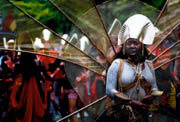 Deeply
ingrained in the German psyche is the belief that culture equals national
culture. No surprise then that the German approach to immigration
has been a bit schizophrenic - as an foreigner you have two options
either keep to yourself with a view to going home or you integrate
completely with a view to becoming a real German. Anything inbetween
would open the specter of multiculturalism.... Deeply
ingrained in the German psyche is the belief that culture equals national
culture. No surprise then that the German approach to immigration
has been a bit schizophrenic - as an foreigner you have two options
either keep to yourself with a view to going home or you integrate
completely with a view to becoming a real German. Anything inbetween
would open the specter of multiculturalism....
Reality check: 1 in 7 Berliners is a foreigner so the city is unavoidably
multicultural. The Karneval der Kulturen is a celebration of the city´s
ethnic diversity and its growth over the past 3 years indicates a
welcome shift from the culture = nation mindset described above.
The Karneval is Berlin's most colourful and vivacious festival, taking
place every year in June over the Whitsun weekend. Thousands of representatives
from over 70 cultures don their glad rags and dance along the streets
of Kreuzberg in a joyous celebration of Berlin's multi-ethnicity.
Four purpose-built stages host all kinds of performances, the main
stage is at Blücherplatz, the children's stage at Mariannenplatz.
|
Love Parade
map:
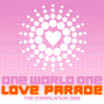 Once
a year on a given Saturday in early July a large number of the world's
party-goers gather to celebrate the now legendary Love Parade. Having
moved to Strasse des 17. Juni, this street party, which started in
1989 on the Ku'damm as demonstration for love, has ballooned into
the biggest Techno/Dance party in the world, attracting hedonists
from all corners of the earth. Excessive amounts of bare flesh are
exposed as the parade, comprising of approximately 1 million fun seekers
(all with their own whistles) dancing on the back of lorries (some
250 in all) and on the street, makes its way up and down Strasse des
17. Juni and round the Großer Stern at the Victory Column in
the middle of Tiergarten. Real techno fans should prepare to be disappointed
as the music tends towards the mainstream-chart-house end of the market.
Despite this, the ethos of the event has escalated so much that fledgling
Love Parades have been hatched in Austria and England. Once
a year on a given Saturday in early July a large number of the world's
party-goers gather to celebrate the now legendary Love Parade. Having
moved to Strasse des 17. Juni, this street party, which started in
1989 on the Ku'damm as demonstration for love, has ballooned into
the biggest Techno/Dance party in the world, attracting hedonists
from all corners of the earth. Excessive amounts of bare flesh are
exposed as the parade, comprising of approximately 1 million fun seekers
(all with their own whistles) dancing on the back of lorries (some
250 in all) and on the street, makes its way up and down Strasse des
17. Juni and round the Großer Stern at the Victory Column in
the middle of Tiergarten. Real techno fans should prepare to be disappointed
as the music tends towards the mainstream-chart-house end of the market.
Despite this, the ethos of the event has escalated so much that fledgling
Love Parades have been hatched in Austria and England.
Accompanied every year by a cringingly cosmic motto (two such examples
being "One World, One Love Parade" and "Join the Love Republic"),
the Berlin parade has gradually mutated into a highly commercialised
circus as each of its "partners" succeed in only blocking sunlight
with their logo-emblazoned balloons. Thankfully, all such things must
come to an end - 2001's event was the first totally commercial Love
Parade (the Berlin Senate finally refused to accept the goings-on
as a political demonstration) and it appears to have been the straw
that broke the camel's back, leaving everybody with a bad taste in
their mouths. 2004 was the final "Love" fest in the commercial
"love" tradition, or so many hoped. If not for the aptly
named fitness-studio chain McFit, which saw fit (sic) to offer the
fast food, fast music, franchise generation more of the mind-numbing
beats and more opportunity to spend their money in Berlin!! The Love
is Back in 2006!
|
Sounds like Home (Heimatklänge)
(Jun-Jul)
map:
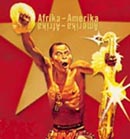 This festival of world music presents a range of music from a different
country or region each year. The idea behind Heimatklänge is
to present bands which are active in their home country. The result
is musical selection which attempts to go beyond the sterotypes of
the world music genre. The theme for the 2006 series was what else?
The Football World Cup!
This festival of world music presents a range of music from a different
country or region each year. The idea behind Heimatklänge is
to present bands which are active in their home country. The result
is musical selection which attempts to go beyond the sterotypes of
the world music genre. The theme for the 2006 series was what else?
The Football World Cup!
|
Fuck Parade
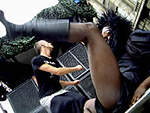 Usually
held on the same day as the Love Parade, the Fuck Parade (which started
its life in 1997 as the Hate Parade) trampled an alternative course
through the streets of Berlin. Those who began to be sickened by the
highly commercialised Love Parade decided to return the day to the
real soul of Berlin, and so created an event where run-down transit
vans and trucks blasted out Gabba, Hard Techno and Drum 'n' Bass.
It was, understandably, more fashionable than the day's highly mainstream
alternative. Things have gone a bit wrong, though. An upping of the
stakes in 2001, when the organisers planned a three-pronged attack
on Alexanderplatz, looked as if it could really challenge its commercial
rival as the party of the day. Even after the Love Parade's unexpected
postponement to the weekend after, the Fuck Parade still enjoyed the
billing as the curtain raiser event that was to launch Berlin's first
"Love Week". Unfortunately, the Berlin Senate's decision not to accept
the Love Parade's status as a political demonstration applied to the
Fuck Parade as well. With no intention of paying for the clean-up,
which the organisers of non-political events are obliged to take responsibility
for, the Senate saw fit to pull the plug on the parade, forbidding
all music. The ensuing Fuck Parade as a "demonstration for a right
to demonstrate" proved to be a damp squib as the aimless organisers
bellowed badly rehearsed references to music and society through megaphones
while the police endeavoured to confiscate all stereos on sight. It
seems the sun has nearly set on the era when street festivals could
rise out of pointless protest. If the organisers of the Fuck Parade
want to wear party hats and blow whistles in the future, they'd better
get used to filling black plastic bags, too. Usually
held on the same day as the Love Parade, the Fuck Parade (which started
its life in 1997 as the Hate Parade) trampled an alternative course
through the streets of Berlin. Those who began to be sickened by the
highly commercialised Love Parade decided to return the day to the
real soul of Berlin, and so created an event where run-down transit
vans and trucks blasted out Gabba, Hard Techno and Drum 'n' Bass.
It was, understandably, more fashionable than the day's highly mainstream
alternative. Things have gone a bit wrong, though. An upping of the
stakes in 2001, when the organisers planned a three-pronged attack
on Alexanderplatz, looked as if it could really challenge its commercial
rival as the party of the day. Even after the Love Parade's unexpected
postponement to the weekend after, the Fuck Parade still enjoyed the
billing as the curtain raiser event that was to launch Berlin's first
"Love Week". Unfortunately, the Berlin Senate's decision not to accept
the Love Parade's status as a political demonstration applied to the
Fuck Parade as well. With no intention of paying for the clean-up,
which the organisers of non-political events are obliged to take responsibility
for, the Senate saw fit to pull the plug on the parade, forbidding
all music. The ensuing Fuck Parade as a "demonstration for a right
to demonstrate" proved to be a damp squib as the aimless organisers
bellowed badly rehearsed references to music and society through megaphones
while the police endeavoured to confiscate all stereos on sight. It
seems the sun has nearly set on the era when street festivals could
rise out of pointless protest. If the organisers of the Fuck Parade
want to wear party hats and blow whistles in the future, they'd better
get used to filling black plastic bags, too.
|
Fete de la Musique
(21 June)
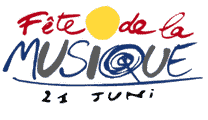
This fete is an annual free music festival originating in France
20 years ago.
On about 50 stages across the city with more than 400 bands representing
all styles of music it celebrates the longest day of the year.
|
Jazz Fest Berlin
(Nov)
http://www.berlinerfestspiele.de
John-Foster-Dulles-Allee 10, 10557 Berlin - Tiergarten | Tel: 39
78 70, Fax: no fax | S-Bhf Lehrter Stadtbahnhof, Unter den Linden,
Bus 100, 248 | Alternate website: www.hkw.de | Date: Annually Oct/Nov.
| Admission: variable.
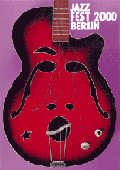 The
Jazz Fest Berlin has a long and enviable history. It started out in
1964 and - at least for the rest of that decade - was involved in
presenting some very interesting and swinging concerts. In its early
years, it was closely connected with the late Joachim Ernst Berendt,
who was known throughout Germany as the 'Jazz Pope'. Berendt brought
Jazz musicians together from all corners of the globe and put them
on stage together. The results can be heard on his influential and
collectable series of MPS/SABA records 'Jazz meets the world'. The
Jazz Fest Berlin has a long and enviable history. It started out in
1964 and - at least for the rest of that decade - was involved in
presenting some very interesting and swinging concerts. In its early
years, it was closely connected with the late Joachim Ernst Berendt,
who was known throughout Germany as the 'Jazz Pope'. Berendt brought
Jazz musicians together from all corners of the globe and put them
on stage together. The results can be heard on his influential and
collectable series of MPS/SABA records 'Jazz meets the world'.
In recent years, the Jazz Fest has been criticised as having gone
somewhat off the boil. However in 2000, it came back into its own,
presenting as it did everything from wordjazz (Ruth Weiss) to cross-cultural
fusions (British tenor saxophonist Alan Skidmore, his quartet and
Amampondo, a six-piece South African drumming group). 2001 brings
a new musical director and promises to be worth checking out if you
are a jazzbo.
|

 top
of page top
of page  ©
1999-2011 Berlin Information Group ©
1999-2011 Berlin Information Group anything
missing or wrong? anything
missing or wrong?
|
 
 |

